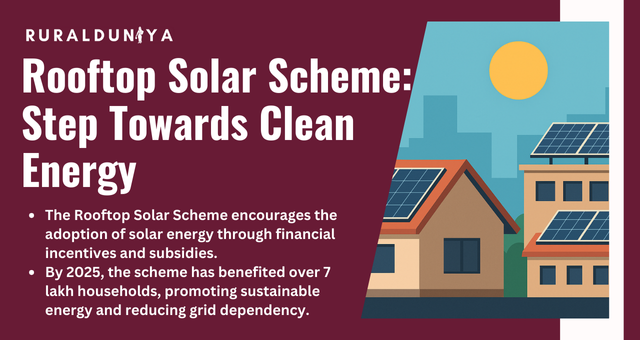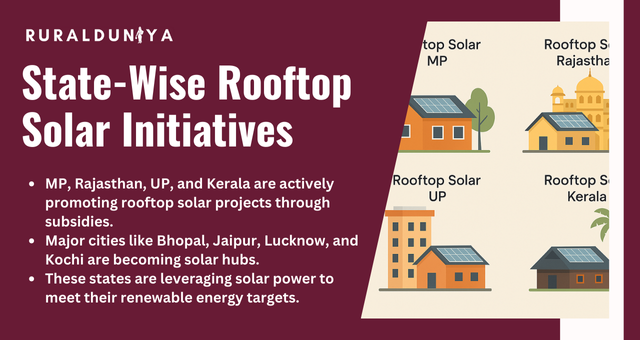Rooftop solar energy is transforming the way households and businesses generate electricity. By installing solar panels on rooftops, individuals can harness solar power to meet their energy needs efficiently.
This method not only reduces dependency on non-renewable energy sources but also significantly cuts down electricity bills. As of 2025, India has achieved over 12 GW of installed solar capacity, contributing significantly to its green energy goals. 💡
Rooftop Solar Scheme: Step Towards Clean Energy

The Rooftop Solar Scheme is a flagship initiative by the Government of India to encourage the adoption of solar energy at the household and institutional levels. This scheme offers financial incentives and subsidies to individuals and organizations for installing solar panels on their rooftops. 🌞
With the global push towards sustainable energy, rooftop systems have gained immense popularity in India. The government is actively promoting rooftop installations to achieve the country’s ambitious renewable energy targets.
Key Features
- Subsidies Up to 40%: Applicable for residential and institutional setups.
- Easy Financing: Loans from public and private sector banks.
- Performance-Based Incentives: Rewards for efficient solar energy generation.
- Grid Connectivity: Smooth integration with the state electricity grid.
📊 By 2025, the scheme has benefited over 7 lakh households, promoting sustainable energy solutions and reducing grid dependency.
Rooftop Solar Benefits
- Cost Savings: Reduces electricity bills by generating power directly from sunlight. 💰
- Environmental Impact: Decreases carbon emissions by replacing fossil fuels. 🌱
- Energy Independence: Minimizes reliance on the conventional power grid. 🔋
- Government Support: Avail financial assistance through subsidies and tax benefits. 💸
- Increased Property Value: Solar installations boost property resale value. 🏡
Rooftop Solar Panels
Choosing the right solar panel is crucial. The most common types are: 🏠
- Monocrystalline Panels: Highly efficient, space-saving.
- Polycrystalline Panels: Cost-effective with moderate efficiency.
- Thin-Film Panels: Lightweight and flexible, ideal for complex roofs.
Selecting the right panel depends on budget, roof space, and energy needs.
Rooftop Solar Finance

Financial support for solar installations includes: 💵
- Subsidies: Up to 40% for residential users.
- Bank Loans: Low-interest options under Priority Sector Lending (PSL).
- EMI Options: Available through NBFCs and cooperative banks.
- Green Financing: Special loans aimed at promoting renewable energy.
Rooftop Solar National Portal
The National Portal for it streamlines the process of adopting solar energy. It offers: 🌐
- Subsidy Details: Information on eligibility and financial support.
- Installer Directory: Find certified providers easily.
- Application Tracking: Monitor progress from registration to installation.
- Support Resources: FAQs and guides for new users.
Visit: solarrooftop.gov.in
Solar Rooftop Online Application
Applying for a solar system online involves: 📝
- Visit the National Portal: Access the Rooftop Solar National Portal.
- Registration: Enter your details and project information.
- Upload Documents: Attach ID proof, property papers, and installation details.
- Submit the Form: Complete the process and await approval.
Rooftop Solar System

A solar system generally comprises: ⚡
- Solar Panels: Capture sunlight and generate DC electricity.
- Inverter: Converts DC to AC for home use.
- Battery Storage: Saves excess power for later use.
- Mounting Structure: Supports panels at an optimal angle.
- Net Metering: Records energy production and consumption.
Rooftop Solar Installation
Steps to install a solar system: 🛠️
- Site Assessment: Evaluate roof strength and exposure.
- System Design: Layout planning for optimal energy capture.
- Installation: Setting up panels, inverters, and wiring.
- Testing: Verifying energy output and system efficiency.
Rooftop Solar PV Power System
The Photovoltaic (PV) power system comprises solar panels that convert sunlight into DC electricity, which is then converted to AC using an inverter. These systems are crucial for ensuring energy independence, especially in areas prone to power cuts. 🌅
State-Wise Rooftop Solar Initiatives

Rooftop Solar MP 🌞
Madhya Pradesh is actively promoting solar adoption with schemes like Saur Mitra and community solar projects. Key cities like Bhopal, Indore, and Jabalpur have become solar hubs.
Rooftop Solar Rajasthan 🌅
Rajasthan, leveraging its sunny climate, leads in solar adoption. Cities like Jaipur, Jodhpur, and Udaipur benefit from 50% subsidies on residential installations and state-supported awareness drives.
Rooftop Solar UP 🌾
Uttar Pradesh offers subsidies up to 35% for residential installations in cities like Lucknow, Kanpur, and Varanasi. The state is integrating solar in smart city projects.
Rooftop Solar Kerala 🌴
Kerala’s Soura Project aims to generate 1,000 MW of solar power by 2025. Cities like Thiruvananthapuram, Kochi, and Kozhikode have seen a surge in residential solar adoption.
Solar Rooftop Calculator
The online calculator helps estimate: 📊
- Savings: Calculate potential reductions in electricity bills.
- Costs: Understand installation expenses based on capacity.
- Payback Time: Evaluate the period to recoup your investment.
Key Takeaways
Rooftop solar systems are paving the way for a sustainable and eco-friendly future. With proactive state initiatives and government support, India is progressing towards its green energy goals. 🌟
Adopting solar not only lowers your carbon footprint but also offers financial benefits and energy independence. 💚
FAQs
What is a rooftop solar system?
It is a setup where solar panels are installed on the roof to generate electricity from sunlight, reducing electricity bills and promoting green energy.
How much does a rooftop solar system cost in India?
The cost varies based on size and type but generally ranges from ₹50,000 to ₹2 lakh per kW after government subsidies.
Can I get a subsidy for installing a rooftop solar system?
Yes, the Government of India offers subsidies up to 40% for residential installations. You can apply through the National Rooftop Solar Portal.
How do I maintain a rooftop solar system?
Maintenance is simple – just clean the panels regularly to remove dust and debris, and inspect wiring periodically to ensure efficiency.

Nishank is a social impact enthusiast with a solid foundation in public policy, micro-enterprise, and agribusiness. Growing up in a farmer’s family has given him a profound connection to rural communities, fueling his passion to empower people towards self-reliance. He completed his undergraduate studies at the Delhi University and earned a master’s degree in Rural Management from National Institute of Rural Development & Panchayati Raj in Hyderabad.



